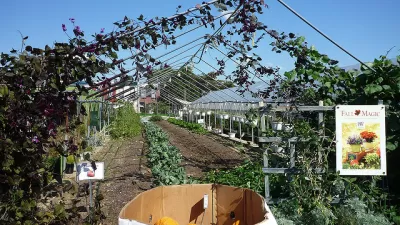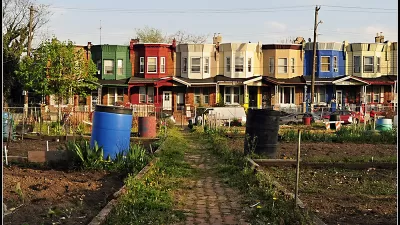Edward Glaeser adds "large-scale metropolitan farming" to a list -- which also includes historic preservation -- of barriers to densifying urban development patterns. His argument is that the latter is the greener of the two.
"All that is grassy is not green," begins Glaeser, in his most recent attack on planning efforts to implement large-scale metropolitan farming, which he believes "will do more harm than good to the environment."
Here's why:
"While neighborhoods benefit from the occasional communal garden, it is a mistake to think that metropolitan areas could or should try to significantly satisfy their own food needs. Good environmentalism is smart environmentalism that thinks through the total systemic impacts of any change. Farm land within a metropolitan area decreases density levels and pushes us apart, and carbon emissions rise dramatically as density falls."
Additionally, he cites a study which found that growing certain crops or livestock less suited for a given climate significantly increases the amount of greenhouse gas emissions and fertilizer required for growing, to the point where it is actually more environmentally friendly to grow where it is most suitable and then have the products shipped over long distances to consumers.
Thanks to Scott Ulrich
FULL STORY: The locavore’s dilemma

Planetizen Federal Action Tracker
A weekly monitor of how Trump’s orders and actions are impacting planners and planning in America.

Maui's Vacation Rental Debate Turns Ugly
Verbal attacks, misinformation campaigns and fistfights plague a high-stakes debate to convert thousands of vacation rentals into long-term housing.

San Francisco Suspends Traffic Calming Amidst Record Deaths
Citing “a challenging fiscal landscape,” the city will cease the program on the heels of 42 traffic deaths, including 24 pedestrians.

Amtrak Rolls Out New Orleans to Alabama “Mardi Gras” Train
The new service will operate morning and evening departures between Mobile and New Orleans.

The Subversive Car-Free Guide to Trump's Great American Road Trip
Car-free ways to access Chicagoland’s best tourist attractions.

San Antonio and Austin are Fusing Into one Massive Megaregion
The region spanning the two central Texas cities is growing fast, posing challenges for local infrastructure and water supplies.
Urban Design for Planners 1: Software Tools
This six-course series explores essential urban design concepts using open source software and equips planners with the tools they need to participate fully in the urban design process.
Planning for Universal Design
Learn the tools for implementing Universal Design in planning regulations.
Heyer Gruel & Associates PA
JM Goldson LLC
Custer County Colorado
City of Camden Redevelopment Agency
City of Astoria
Transportation Research & Education Center (TREC) at Portland State University
Jefferson Parish Government
Camden Redevelopment Agency
City of Claremont





























